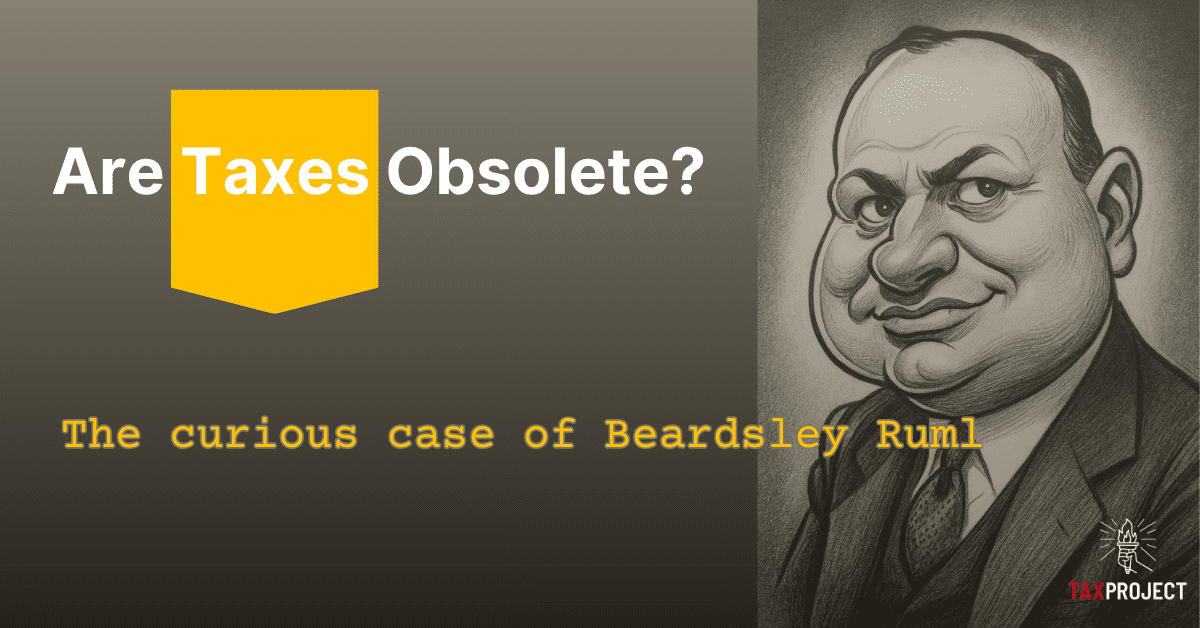America’s independence didn’t begin with fireworks, but with taxes.
When we celebrate the Fourth of July, we reflect on liberty, self-government, and the founding of a new nation. But the origins of that revolution lie in a tangible, financial reality: taxation. Specifically, taxation without representation.
America’s founding generation did not rise up solely over philosophical ideals. Their unrest was rooted in how government decisions about taxation—made in distant London without colonial input—directly affected their businesses, their livelihoods, and their autonomy. Many of the most iconic events leading to the Revolution were reactions to tax policies that were seen as illegitimate, poorly designed, or unjustly enforced. Understanding those details helps us grasp what kind of civic engagement sparked a new nation—and why that engagement is still relevant today.
The Tax Acts that became a Revolution
The Stamp Act (1765)
The Stamp Act was the first direct internal tax levied by Parliament on the colonies. A direct tax means it was collected from individuals at the point of use, rather than being imposed on imported goods at the port. An internal tax meant it applied to activities within the colonies, not cross-border trade.
This law required that many types of printed materials—including legal documents, newspapers, contracts, and even playing cards—be produced on stamped paper that was taxed and provided by British authorities. The cost varied by item but typically ranged from a few pence to several shillings. For example, a college diploma could cost up to £2 sterling, while a newspaper might cost 1 penny extra per issue. A shilling in 1765 could be equivalent to $15–20 today when adjusted for labor value or purchasing power [1].
Colonists saw this as a major overreach. It bypassed local colonial legislatures, and more importantly, they had no elected representatives in Parliament to approve or debate the tax.
“The distinction between legislation and taxation is essentially this: taxation is a part of sovereignty.”
James Otis
Colonial reaction
Protests and public meetings broke out in nearly every colony. Organized groups like the Sons of Liberty formed to resist the tax, often intimidating tax distributors into resigning. In several cities, stamped paper was seized and destroyed. The Stamp Act Congress met in New York in October 1765, uniting delegates from nine colonies to issue a Declaration of Rights and Grievances. Under pressure, Parliament repealed the Act in 1766.
The Townshend Acts (1767)
In 1767, Parliament passed the Townshend Acts, imposing import duties on goods including glass, lead, paper, paint, and tea. Unlike the Stamp Act, these were external taxes—applied at the port of entry rather than at the point of purchase.
To enforce the duties, British customs officials began using writs of assistance—broad, open-ended search warrants that allowed them to enter homes, warehouses, and businesses without specific cause or judicial oversight, to search for smuggled goods. These writs violated long-standing English legal traditions of private property and due process, and they outraged colonists, especially merchants.
To resist, colonists organized non-importation agreements: voluntary, colony-wide pledges not to import or buy British goods subject to the duties. These agreements were enforced socially and economically. Committees of Correspondence monitored local compliance, and violators were often shamed in newspapers or boycotted by neighbors. In New England, women organized spinning bees to produce homespun cloth, replacing British textiles.
“They tax us without our consent… they have erected a tyranny over us.”
Thomas Jefferson
Colonial reaction
Boycotts led to a dramatic drop in British exports to America. Parliament eventually repealed most of the Townshend duties in 1770, except for the one on tea, which was retained to affirm Parliament’s right to tax the colonies.
The Tea Act (1773)
The Tea Act did not impose a new tax—in fact, it lowered the total price of legally imported British tea by allowing the British East India Company to sell tea directly to colonial ports, bypassing colonial merchants. The tea still carried the existing Townshend duty of 3 pence per pound, but the Company could now avoid intermediaries and sell at lower prices.
This made British tea cheaper than the untaxed, smuggled Dutch tea widely consumed by colonists, even with the tax included [2]. Parliament hoped this would increase legal sales and shore up the East India Company, which was financially troubled.
That’s right, contrary to many stories of what you are told the British did NOT raise taxes, and in fact lowered prices!
However, colonists viewed this as a political trap: buying the cheaper tea would imply acceptance of Parliament’s right to tax them, and it would undercut local merchants and smugglers, especially in Boston, New York, and Philadelphia.
| Component | Pre-Tea Act British Tea | Dutch Smuggled Tea | Post-Tea Act British Tea |
|---|---|---|---|
| Base cost of tea (East India Co.) | 12 pence (higher quality) | 10 pence (lower quality) | 12 pence |
| British export tax (before Tea Act) | 12 pence (1 shilling) | — | 0 |
| Shipping/handling fees | 3–5 pence | 2–3 pence | 3–5 pence |
| Import duty in colonies (Townshend) | 3 pence | 0 (smuggled) | 3 pence |
| Merchant markups | 4–6 pence | 3–4 pence | 0–2 pence (direct sale) |
| Total Estimated Price/lb | 34–38 pence | 18–20 pence | 18–20 pence |
Estimates [7]
Colonial reaction
In several colonies, shipments of tea were turned away or returned to England. In Boston, Governor Thomas Hutchinson refused to let the tea ships leave without unloading. On the night of December 16, 1773, a group of men—some dressed as Mohawk Indians—boarded the Dartmouth, Eleanor, and Beaver and dumped 342 chests of tea, worth approximately £9,659 at the time (roughly $1.7 million today), into the harbor [3].
This act of defiance became known as the Boston Tea Party. In response, Parliament passed the Coercive Acts (or “Intolerable Acts”), which shut down Boston Harbor and revoked Massachusetts’ charter.
“It is the right of the people to alter or abolish it, and to institute new Government.”
Declaration of Independence, Thomas Jefferson
What Has Changed?
By most estimates, colonists in the 1760s and early 1770s paid about 1–2% of their income in taxes, largely through tariffs and excise duties [4]. Today, the average American pays more than 25% of income in federal, state, and local taxes, plus additional excise and sales taxes.
But here’s the deeper question: Are we more or less engaged today?
Do we notice when taxes take 1–2% of our income? Or 25%? Do we understand where our money goes, who decides, or whether it is spent effectively? Do we even ask?
Polls show that less than 20% of Americans say they understand how the federal budget works, and more than half say they don’t know enough to weigh in on spending changes [5][6].
In contrast, the colonists organized mass boycotts, convened assemblies, debated in pamphlets, and took to the streets over marginal tax changes. They understood that liberty and civic duty were inseparable.
“The price of liberty is eternal vigilance.”
Thomas Jefferson
Have bravery, liberty, and civic engagement given way to apathy and resignation? The answer to that question shapes the future of our democracy.
Reclaiming the Spirit of Engagement
The American Revolution was never just about tax rates. It was about agency. The idea that taxation must come with representation, transparency, and public accountability was at the heart of the colonists’ cause.
Today, tax policy still shapes nearly every aspect of national life—from infrastructure to education to foreign policy. But public knowledge and participation are often lacking.
“Posterity! You will never know how much it cost the present generation to preserve your freedom.”
John Adams
This Independence Day, while you’re taking in a Ballgame, enjoying a hot dog or apple pie, remember the bravery, risks, and sacrifices ordinary people took to stay informed, speak out, and take action. From newspaper editors to farmers, from lawyers to dockworkers, their courage helped forge a path toward representative government and freedoms we enjoy today.
“Freedom is never more than one generation away from extinction.”
Ronald Reagan
At TaxProject.org, we believe that spirit lives on—not in protest or revolution, but in informed engagement. When you understand how your tax dollars are spent and how they are used— you keep the Spirit of ’76 alive for future generations.
So this July 4th, don’t just celebrate freedom, remember that each Citizen plays a small but important role in honoring the sacrifices of our founders and keeping the American Dream alive.
Citations
[1] MeasuringWorth.com, “Comparing the Purchasing Power of Money in Great Britain, 1270 to Present,” https://www.measuringworth.com
[2] Benjamin Carp, Defiance of the Patriots: The Boston Tea Party and the Making of America, Yale University Press, 2010.
[3] U.S. National Archives, “The Boston Tea Party,” https://www.archives.gov/exhibits/treasures_of_congress/text/page11_text.html
[4] Mark Koyama, Taxation and the Colonial American Economy, George Mason University, 2012.
[5] Pew Research Center, “Public Trust in Government: 1958-2023,” https://www.pewresearch.org/politics/2023/06/06/public-trust-in-government-1958-2023/
Tational Archives, “The Boston Tea Party,” https://www.archives.gov/exhibits/treasures_of_congress/text/page11_text.html
[4] Mark Koyama, Taxation and the Colonial American Economy, George Mason University, 2012.
[5] Pew Research Center, “Public Trust in Government: 1958-2023,” https://www.pewresearch.org/politics/2023/06/06/public-trust-in-government-1958-2023/
[6] NPR/Ipsos Poll. “Americans Agree the Federal Budget Should Be Balanced — But Don’t Know the Details.”
https://www.npr.org/2022/03/15/1086533873/federal-budget-deficit-debt-education
[7] Carp, Benjamin L. Defiance of the Patriots: The Boston Tea Party and the Making of America. Yale University Press, 2010.











